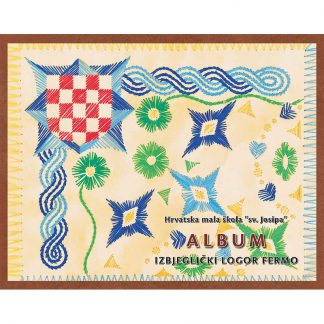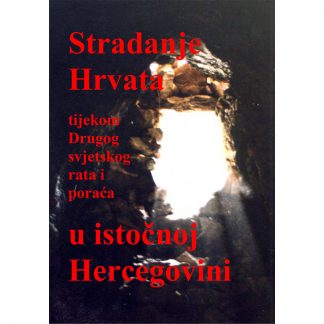Opis
This book is dedicated to Jozo and Mara, my parents,
to Stana and Luca, my sisters, and to Niko and Jozo, my brothers,
thanking them for all they had to endure at the hands of the
communists during my imprisonment.
Baldo Zlovečera
INTRODUCTION
At the center of the concentration camp, on the side of the Velika Draga/Great Cove, there stood an elevation, namely, a tall, steep cliff. The toilet facilities were located there, that is, the bathhouse, and, most likely, the longest and largest toilet in the world. It had some 80 squat toilets set in two facing rows — all without any sort of wall separation between them.
Behind that building, from which the powerful smell of chlorine bleach was stinging one’s eyes and lungs, a small “plaza” was to be found — actually, it was almost at the edge of the fence surrounding the concentration camp. From this plaza-like space one could see more than half of the camp known as Žica (Barbed wire). The “plaza” was on the leeward side and it was protected from the northern wind (called bura) by the bathhouse building. The hill above the small port — situated in front of the wire fence — deflected the southern wind (called jugo) to the other side of the camp. Thus, this no-man’s land became my occasional evening walking ground.
Some sort of inner drive often motivated me to be alone so that I might free myself from the prison crowd and from its routine. However, when the south winds blew, and when it appeared as though it seemingly wished to blow away the camp’s harbor, more likely to be the case when the air was damp and putrid, I would take off for that plaza area, as though it were some sort of oasis, to sneak a smoke. I would gaze at the sea gulls as they, quite self-assured, swayed to-and-fro as though suspended by some unseen cord. While they swayed cradle-like up above, necks extended, I would increasingly have the crazy wish that I, too, could ascend into the air carried by the wind. I would become aware of the passage of time and it was as though I was being haunted by so many places, things, walls, stone quarries, stairways, and pathways across the island. These places served as deaf but at the same time loud witnesses to the former tortures evoking within me images, faces, screams, moans and groans, and, most especially, feelings of uncertainty — when morning feared it would not see the night without blood being shed that day — while the dark gave no assurance of a safe night of sleep. I often thought: “Is it possible that I endured five long years on that torture-rack of an island without having gone mad?”
I was reaching thirty. Thirty years, not seven; young, empty, hungry, and senseless years!
Lazily, as though the passage of each minute actually was coming to a hold, time did slip by thus shortening my incarceration. I could actually mark the day of my release on a calendar. The very fact that one could circle the date of that much-anticipated event on the calendar, served as a sure step to freedom. Meanwhile, with the passage of these first signs of anticipation, and animated self-complacent expectations, one begins to ask in fear: “And, what am I to do with the return of freedom? Won’t the opposite, in fact, take place, namely, with freedom, won’t I actually have no freedom or right to ‘ordinary’ life, work, study? Will I always have somebody shadowing me? Anyway, who would hire a political prisoner — especially one coming from Goli Otok, [Barren Island], Tito’ concentration camp?”
One can’t even begin to dream of political activity. The very thought of such activity assumes an inherent tragicomic character. There is no other choice but for one to “button his lip” tightly and to bury one’s pen deeply considering that dimension of man’s personhood — a dimension enjoyed as a right long ago by the Athenians — cannot even be dreamed of by a citizen living in “democratic” Yugoslavia unless he is willing to become a deaf-muted, two-faced irrational Communist Party fetish. One can only dream of such a thing behind the tightly closed doors of one’s house — and under the condition that one is alone. Even if one “speaks” to himself about such things, it still feels as though in the presence of others. Such mindless monologs born of boredom are a part of the all-encompassing plan of the Yugoslav penal system’s regulations against “unfriendly” propaganda.
Nonetheless, this curse of political thought, that revolt of sane reason, because of the denial of the right to freedom of thought for which sake I lost my youth, is so ingrained within my soul that it would be impossible for me to pluck it from my being. In the very attempt to do so, a man would suffer the fate of a bee that loses its very life with the sting it imparts.
Through the course of my incarceration, such feeling and disquiet became stronger and evermore distinct — especially during the evening hours when I would attempt to put together all that I had experienced and sketch my unclear future plans through clouds of cigarette smoke. My thoughts would begin to quiet for a moment with the rhythm of each breath and the red-glow of a lit cigarette waiting for the next delayed puff to come. What can a man say to himself before so many unknowns that are formed within him through a multi-year of inhuman captivity? Life, freedom, studies, work, a family — in a word, that which one sees as a not-so-distant future, a future which a man eavesdrops on and sees as an unbelievable fable, that with the passage of time in fact becomes more distant than near.
Once, while I was pondering such thoughts that tortured my soul, two or three youths approached me — youths of some twenty years or so. I knew them well. When I first saw them some months before, they appeared to me to be frightened young men — actually, lost souls among us old-time prisoners. Meanwhile, they quickly found their bearings and soon became “veteran” prisoners who were freed from ill ease and subconscious fears — they, in fact, became evermore conscious of their new status in life, namely, that of being “political” prisoners.
While we were smoking — what else can a prisoner do in his so-called free time, a time when he is not being pushed around — we engaged in a conversation about all sorts of banalities ,until they felt secure in asking me one moment this, another that. As I listened to their queries, actually questions about my past, and, to them yet unknown days of my life on Goli, images of the first days of my incarceration as a prisoner on the island came back to my mind. At that time, I had the same worries as they had. In the end, one of them became bold enough to bashfully ask: “Is it true that prisoners were tortured here on the island?”
At that question, my gut churned as though I had just drunk a bitter poison. My eyes flashed like a bolt of lightning and my pupils almost burst!
The question asked — even though I answered it — hung heavy in the air. It was a question that I long bore and heard to the point where it assumed the character of an obligation.
By gathering what I experienced personally, what I learnt from those condemned to Goli Island since the very beginning of the camp in 1949, and from facts obtained with the help of acquaintances from members of the UDBA [Yugoslav Secret Police] who participated in establishing the Goli Island concentration camp, I am convinced that I succeeded in at least establishing a skeletal image of that monstrosity.
To all those — living or dead — who aided me in presenting to the public this sketch of the structure of torture and evil that was the concentration camp known as Goli Island, I am warmly grateful.
EPILOGUE
Close to the end of the sixties, much was written in Yugoslavia about the Rade Radevic´ affair. He was the former administrator of the “Rehabilitation Prison Rab,” that is, Goli Island itself.
Administrator Radevic´ had the nice custom of gifting his friends with expensive gifts: to some, a Mercedes, or to others, a vacation on the seashore, or even, beautiful and modern yachts.
An investigation revealed that Comrade Radevic´ filched money for those expensive gifts from the account of the Kombinat [Enterprise] Velebit. In essence, he pilfered the money from the sweat of the prisoners in the worksite on Goli, and also, from the monies the Prison Camp was to receive for the maintenance of its inmates. He, in essence, deprived the prisoners from the food and clothing they should have had and which was, itself, minimal to begin with.
Meanwhile, on the Island of Goli — the threshing floor of evil — the chaff continued to be threshed and tossed into the air, all within the eye of unspeakable evil. Today, young criminals and political prisoners are still to be found on Goli working for new people like Radevic´.
PART OF THE PRISON CAMP, KNOWN AS ‘ŽICA’
“At nightfall, the prisoners would wearily return to the Žica, only to be forced to attend the interminable “corrective meetings.” The meetings were held in the center of the camp located on a small elevation. It was there that those who supposedly had been dissuaded from their “prejudices” would attempt to demonstrate that they had been genuinely rehabilitated, and that they were convinced that Comrade Tito and the Communist Party of Yugoslavia were in the right and that they had been misled into error by the Russians… Once the penitent would have expressed his regret sufficiently, and once the mob had been satisfied, it would begin to chant fanatically: “Tito! The Party! Tito! The Party!” They would continue to chant so fervently until they were taken into a hypnotic state almost to the point of lunacy.”
Baldo Zlovečera





